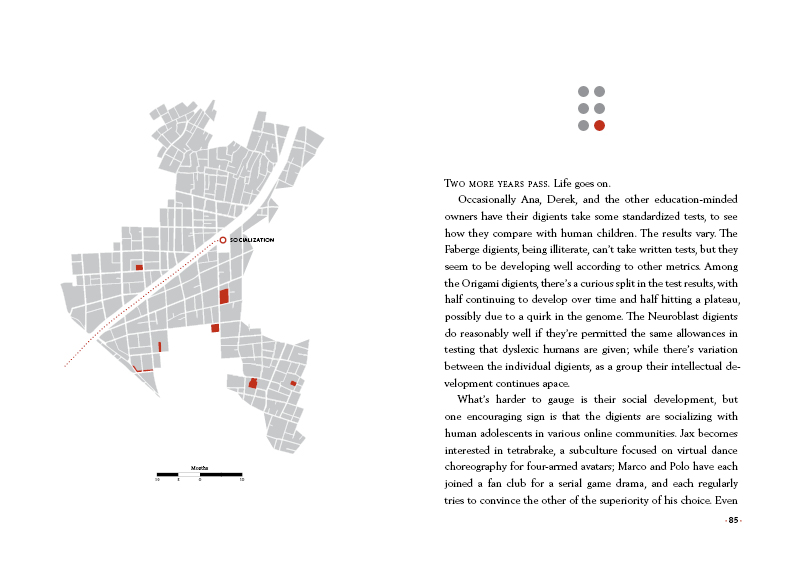
This week I got back to a science-fiction novella written by Ted Chiang back in 2010, called "The Lifecycle of Software Objects". It basically relates the evolution of digital entities called "digients" as they develop, raised by human trainers over the course of many years. I read it ten years ago and enjoyed this second perusal.
Some excepts I found interesting:
"The onscreen annotations identify them as digients, digital organisms that live in environments like Data Earth, but they don’t look like any that Ana’s seen before. These aren’t the idealized pets marketed to people who can’t commit to a real animal; they lack the picture-perfect cuteness, and their movements are too awkward. Neither do they look like inhabitants of Data Earth’s biomes: Ana has visited the Pangaea archipelago, seen the unipedal kangaroos and bidirectional snakes that evolved in its various hothouses, and these digients clearly didn’t originate there." (page 3)
"'These guys are newly instantiated. It takes them a few months subjective to learn the basics: how to interpret visual stimuli, how to move their limbs, how solid objects behave. We run them in a hothouse during that stage, so it all takes about a week. When they're ready to learn language and social interaction, we switch to running them in real time. That's where you would come in.'" (page 5)
"the failure of the hothouse experiments to pro- duce miniature civilizations has caused general interest in digital lifeforms to dwindle. Occasionally curious new fauna are observed in the biomes, a species demonstrating an exotic body plan or a novel reproductive strategy, but it's generally agreed that the biomes aren't run at a high enough resolution for real intelligence to evolve there. The companies that make the Origami and Faberge genomes go into decline. Many technology pundits declare digients to be a dead end, proof that embodied AI is useless for anything beyond entertainment, until the introduction of a new genomic engine called Sophonce." (page 65-66)
And this dialogue as well:
"It's one thing for Jax to have ways to keep himself entertained outside of class," she says.
"But to give him assignments and tell him he has to finish them even if he doesn't enjoy it? To make him feel bad if he doesn't do it? That goes against every principle of animal training."
"A long time ago, you were the one who told me that digients weren't like animals."
"Yes, I did say that," she allows. "But they're not tools either. And I know you know that, but what you're talking about, it sounds like you're preparing them to do work that they wouldn't want to do."
He shakes his head. "It's not about making them work, it's about getting them to learn some responsibility. And they might be strong enough to take feeling bad once in a while; the only way to know is to try."
"Why take the chance of making them feel bad at all?"
"It was something I thought of when I was talking with my sister," he says. Derek's sister teaches children born with Down syndrome. "She mentioned that some parents don't want to push their kids too much, because they're afraid of exposing them to the possibility of failure. The parents mean well, but they're keeping their kids from reaching their full potential when they coddle them."
It takes her a little time to get used to this idea. Ana's accustomed to thinking of the digients as supremely gifted apes, and while in the past people have compared apes to children with special needs, it was always more of a metaphor. To view the digients more literally as special-needs children requires a shift in perspective. "How much responsibility do you think the digients can handle?" (page 73-74)
Why do I blog this? While lots of readers described this little book as focused on the meaning of consciousness or the social and moral implications of creating intelligent beings for commercial purposes, my interest was piqued by the description of various kinds of relations human trainers/owners of digients build and maintain with these entities. The discussion revolves around how nurturing them could be compared to parenthood or pet ownership. What I find relevant here, with regards to the Machine Mirabilia project, is that this kind of speculative fiction helps questioning and rethinking the multiples relationships human beings have with non-human entities, living beings and non-living ones.